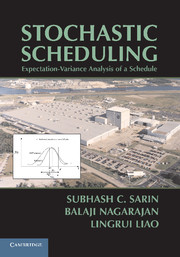Book contents
- Frontmatter
- Contents
- Foreword
- Preface
- STOCHASTIC SCHEDULING
- 1 Introduction
- 2 Robust Scheduling Approaches to Hedge against Processing Time Uncertainty
- 3 Expectation-Variance Analysis in Stochastic Multiobjective Scheduling
- 4 Single-Machine Models
- 5 Flow-Shop Models
- 6 Job-Shop Models
- 7 Parallel-Machine Models
- 8 The Case of General Processing Time Distribution
- 9 Concluding Remarks
- Appendix
- Bibliography
- Index
2 - Robust Scheduling Approaches to Hedge against Processing Time Uncertainty
Published online by Cambridge University Press: 05 July 2014
- Frontmatter
- Contents
- Foreword
- Preface
- STOCHASTIC SCHEDULING
- 1 Introduction
- 2 Robust Scheduling Approaches to Hedge against Processing Time Uncertainty
- 3 Expectation-Variance Analysis in Stochastic Multiobjective Scheduling
- 4 Single-Machine Models
- 5 Flow-Shop Models
- 6 Job-Shop Models
- 7 Parallel-Machine Models
- 8 The Case of General Processing Time Distribution
- 9 Concluding Remarks
- Appendix
- Bibliography
- Index
Summary
Introduction
Robust scheduling is one of the approaches adopted to deal with uncertainties in stochastic scheduling. Since these uncertainties, arising as they do from variability in the scheduling parameters, significantly affect the performance of a system, a viable approach has been to determine a robust schedule that is least susceptible to disturbances or variations in the input parameters and that has minimum variability in its output performance measure. For instance, when processing times are uncertain, a robust schedule would have the least variance of the output performance measure, although it might not necessarily have the least expected value. As also mentioned in Chapter 1, of the various parameters involved in scheduling, we intend to focus on the uncertainty factor associated with job processing times. The following sections detail different robust scheduling methodologies that are available to model certain scheduling environments and the underlying principles behind those various approaches. Our primary focus is to elicit and delve in detail on the modeling approaches and not to expostulate the solution methodologies. However, we do briefly discuss the various solution approaches that are used to solve these robust scheduling problems and also state relevant results (as propositions) that are used in developing these solution methodologies. We intend to capture the core techniques that have been used in modeling robustness in scheduling and would advise interested readers to refer to the appropriate literature for a detailed and complete exposition.
- Type
- Chapter
- Information
- Stochastic SchedulingExpectation-Variance Analysis of a Schedule, pp. 12 - 31Publisher: Cambridge University PressPrint publication year: 2010



